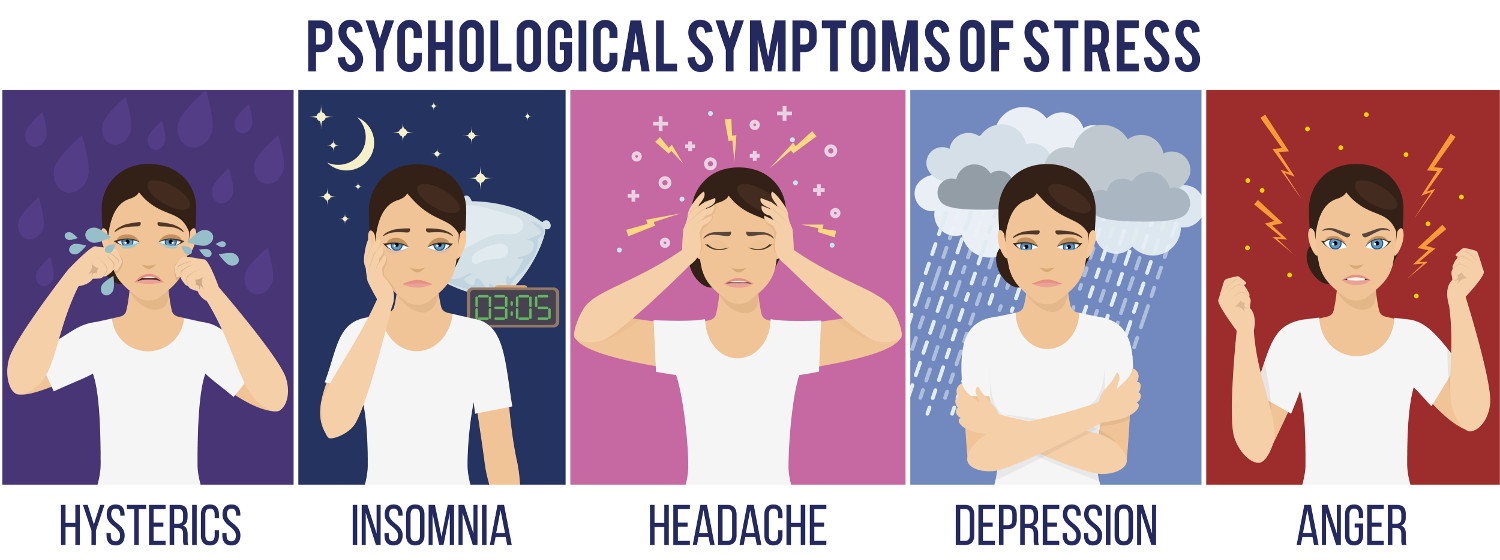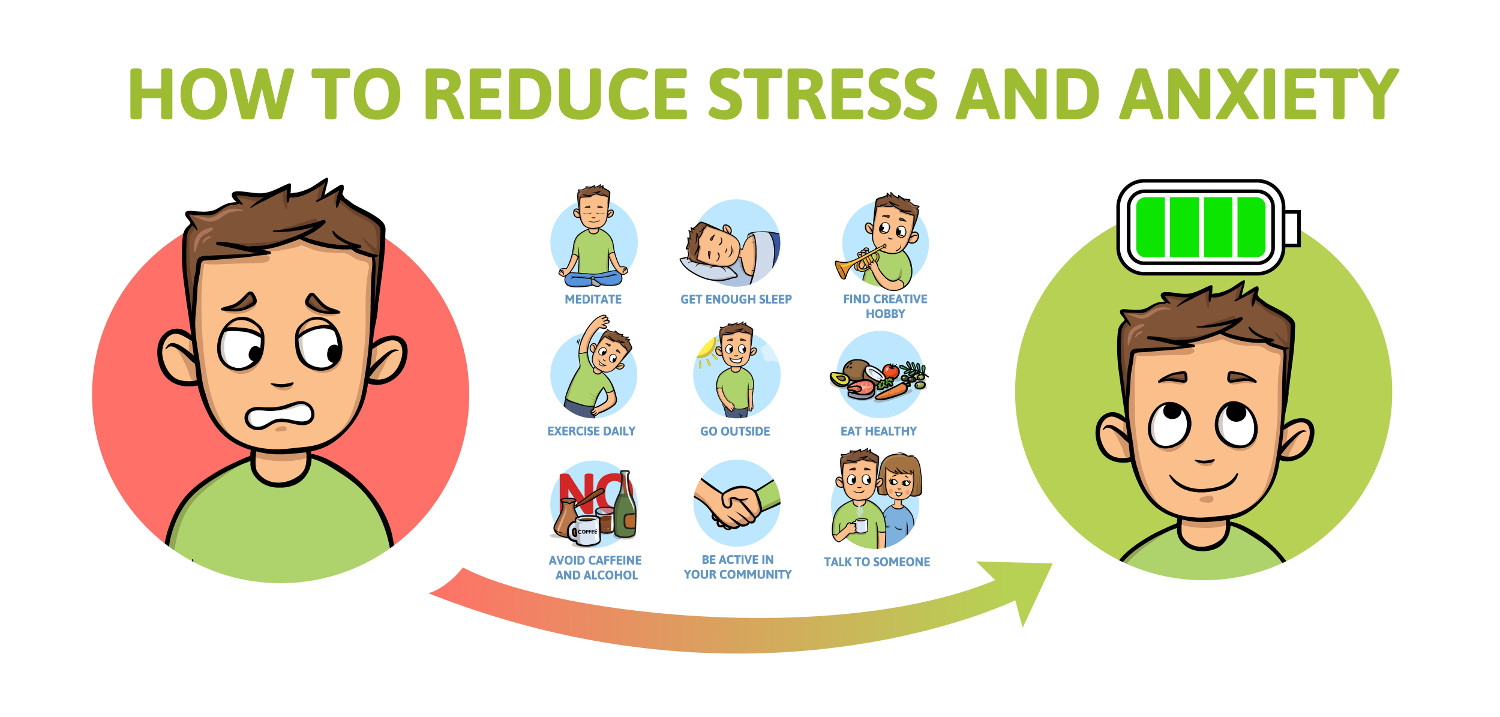
Stress
What is Stress?
Stress is a completely normal part of life. In the most basic terminology, stress is the body's response to the demands placed on it 1. These demands require a change in the body. The body responds through emotional, physical, or mental pathways. Interestingly, your ancestors relied on stress to avoid and overcome potentially life-threatening situations. For instance, your ancestor would see a threat, such as a bear. Adrenaline and cortisol would flood their system. Their heart would begin to race. Their breathing became faster. Their body would tense up, primed to take action, such as run away or fight the threat.
Today, the stress reaction rarely occurs due to life-threatening situations. More so, individuals become stressed due to the fast-pace of society and the responsibilities involved in their day-to-day life. In modern society, there is constant stimulation, which can add to your stress. In chronic situations, stress can become a health problem. However, this isn't to say that some stress can't be good. When stress is good, it's minimal and it fuels motivation and drive. Yet, stress that goes on for many months and years can lead to detrimental health issues. It can even shorten your lifespan. The good news? You can recognize and manage the stress in your life. This article explores why stress happens and how to manage it. What should you know?
What are the Symptoms of Stress?
Stress manifests in many different ways. Common symptoms include:
- You become easily irritated or experience mood swings.
- You feel overwhelmed.
- You find it difficult to relax.
- You have begun to feel lonely and depressed.
- You may avoid other individuals.
- Fatigue.
- Headaches.
- Stomach issues, such as constipation, diarrhea, or nausea.
- Muscle aches and pains.
- Chest pain.
- Racing heart.
- You frequently get ill, such as with colds, flues, or infections.
- Dry mouth.
- Teeth grinding.
- Racing thoughts.
- Frequent worries.
- You've become more forgetful.
- You can't focus.
- You frequently only see the negative perspective.
- Lose of appetite.
- You've begun using alcohol or drugs frequently.
- Procrastination or avoidance of responsibilities.
- Lack of motivation.
- Panic attacks.

It's important to note that stress may appear differently in each individual. Further, other symptoms may arise in the long-term if stress is not managed. These symptoms may include depression, anxiety, cardiovascular problems, obesity, menstrual issues, skin problems, and chronic gastrointestinal issues. In fact, research shows that long-term stress can lead to an array of chronic diseases 2. Ultimately, stress can also make it difficult for a person to function, especially if their cognitive processes begin to be affected.
Can Stress Cause Vertigo?
Vertigo refers to the feeling where your environment is spinning. It's frequently referred to as an ‘illusion of movement.' A 2006 study indicated that stress could potentially lead to types of vertigo 3. Interestingly, many individuals that suffer from vertigo, experience it more or find it gets worse during times of emotional stress. Further, anxiety can also cause the onset of vertigo episodes.
Can Stress Make You Ill?
Can stress make you sick? Can stress go so far as to kill you? The short answer is yes. Research shows that chronic stress can lead to life-threatening and chronic disease 4. Many experts theorize this is due to increased inflammation that arises in the body due to stress, as well as the body's lack of resources and energy put toward immunity. Surprisingly, inflammation is a major marker in many chronic diseases, such as heart disease. And when it comes down to it, these diseases can lead to death. This is why it's vitally important for each person to learn how to manage and prevent chronic stress from occurring.
Are Stress and Anxiety the Same?
Stress and anxiety have slight differences. Stress is frequently caused by frustration, overwhelm, or nerve-racking events. Anxiety, on the other hand, has to do more with worrying or feeling fearful. Yet, anxiety can occur as a reaction to stress. And small amounts of both are normal reactions to events in one's life. However, if you've been experiencing increasing anxiety, it may be best to book an appointment with your doctor. They can assess your situation and determine an appropriate plan of action, such as therapy, to help you cope with it. This may also help some individuals deal with extreme stress as well.
Can Stress Cause Weight Loss?
Yes, extreme stress can lead to weight loss. This may happen due to a lack of appetite, causing the person to eat less. On the other hand, stress may also cause weight gain. Others may partake in emotional eating when feeling stressed or overwhelmed. Consequently, in the long-term, this may cause the person to put on weight.
What Causes Stress?
Stress may arise due to a variety of reasons. Common triggers of the stress response include events that occur in our job lives or family lives. For instance, financial strain is a common stress trigger. However, what causes stress for you may not cause stress for your friend or family member.
Common causes of stress include:
- Overworking.
- Job loss.
- Relationship issues.
- Death of a loved one.
- Problems in school.
- Bullying.
- Busy schedule leading to overwhelm.
- A recent move to a new place.
Yet, stress triggers aren't limited to these. Again, it depends on the individual as to what triggers stress in their life.
How to Prevent Stress?
Identifying your potential stress triggers is important for overall stress prevention and management. If you know that taking on too many projects at once is going to stress you out, set your limits. Know where your threshold is. Or if a bad and toxic relationship is leading to your stress, it may be time to end it.
How can you identify your triggers? Ask yourself when you feel most unease during your day. You may notice a recurring pattern that shows you where your stress is manifesting from. Find ways to cope and manage it accordingly. If you can, avoid it altogether.
In addition, preventing stress comes down to your lifestyle choices. Eating a healthy and balanced diet and exercising can help significantly decrease your stress levels. We'll look at this in more detail in the section below.

Treating Stress: What is Stress Management?
Stress management refers to how you cope and deal with stress. As aforementioned, stress is completely normal. We all experience it as one point or another. In some cases, the entity causing your stress may disappear and this may relieve the stress you were feeling. In other cases, it comes down to having the proper strategies in place to deal with stress in your life. The following outlines how you can treat stress, as well as avoid letting it stand in the way of your health and happiness.
1. Exercise
Regular physical activity has shown to help decrease stress. When you exercise, your body releases endorphins. Endorphins are your body's natural pain relievers and they make you feel good. This can help combat stress and its symptoms. One study even showed regular exercise improved emotional resilience, lowering stress levels in healthy adults 5.
Most experts recommend about 150 minutes of moderate exercise per week. Interestingly, most people do not meet these recommendations. Thus, exercise is one of the best lifestyle changes you can make that may benefit your health the most.
2. Try Acupuncture
Research has shown that acupuncture can help relieve stress 6. Acupuncture involves the use of thin needles applied to acupuncture points throughout the body. Experts indicate that acupuncture may work by releasing endorphins near the site of application. In turn, this can help relax and de-stress you.
3. Meditate
Meditation involves clearing your mind through mindfulness. Frequently, it involves focusing on a particular object or activity. Many individuals use this technique to gain better emotional resilience, self-awareness, and stability. As such, it can help you combat stress, especially in the long-term. It can also help prevent it entirely.
In one study, mindfulness meditation was found to reduce stress and anxiety in college students 77. However, it was also indicated in this study that more research was needed.
4. Use Heat Therapy to Relax
Warm bathing has shown to induce a relaxation response while decreasing the stress response. A 2018 study suggested that immersion bathing in warm water can help decrease stress, anxiety, as well as improve other physical and emotional aspects regarding one's quality of life 8.
5. Perform Deep Breathing Exercises
Research shows that deep breathing exercises can improve mood and decrease stress 9. Try beginning with slow deep inhales while counting to five. Do the same as you exhale. Aim to do this exercise for two to five minutes at a time and you may notice your stress levels decrease.
6. Other Lifestyle Approaches
Various other self-care methods can help lower the stress in your life. These include: Sleep Optimization: Most experts recommend the average adult get at least 7-9 hours of sleep per night. To ensure you achieve a quality sleep, perfect your bedtime routine. Wind down 1-2 hours before bed. This should involve a relaxing activity, such as reading, meditating, or relaxing in a warm bath. Daily Physical Activity: While intentional exercise is important, make sure you move everyday. This means that if you sit at a desk all day, aim to get up and stress or walk for a few minutes every 1-2 hours. The body wasn't made to sit 24/7.
Social Support: Talking it out with family and friends can significantly decrease your stress levels as well. Nutrition: Ensure you eat a healthy and balanced diet. Limit processed and pre-packaged foods. Surprisingly, the chemicals used during processing may lead to increased physical stress in your body, impacting your mood and your health.
Find Relaxing Activities to Perform: Many of these were mentioned above. However, stress-relieving hobbies, such as getting out in nature or gardening, have shown to also help individuals cope with life's stressors 10.
There are various ways to cope with stress. Self-care tactics that may further help involve thinking more positively, finding ways to increase your self-esteem and confidence, and asking for help when you need it. Further, even simply organizing yourself and your tasks can help decrease the stress in your life.
How Can Massage Help You De-Stress?
Massage is also a great addition to your self-care routine. Research shows massage can help combat stress. One study showed trigger-point massage therapy, in particular, to increase parasympathetic activity and induce a relaxation response. Researchers further measured decreased heart rate, systolic blood pressure, and diastolic blood pressure in the participants that underwent trigger-point massage 11. Other studies have shown similar responses. For instance, a 2001 study showed the relaxation response after only a 10 minute back rub 12.
Massage therapy, more specifically Swedish massage, promotes this relaxation response through improved circulation and decreased muscle tension. By applying pressure to the muscles and their corresponding tissues, the muscles relax, which allow you feel less tense and less stressed. Massage also has an array of other health benefits, including improving healing and increasing range of motion.
Always check with your GP before booking a massage appointment. Find out if massage therapy is right for you and your current situation. Your doctor may then give you the green light, as well as refer you to a massage therapist. At your first massage appointment, your therapist will ask about your past medical history and your reason for seeking out a massage. They will then determine an appropriate style of massage for you and a potential treatment plan. At each appointment, ensure you communicate with your therapist. If pain occurs, let them know. They will adjust accordingly. In fact, a good massage therapist encourages feedback from each client and each session. Your massage therapist may also ask at each session how your stress levels were after your last appointment. They may then use that information to make adjustments accordingly.
Don't let chronic stress begin to impact your health. Find viable ways to cope and relax. Start using massage today to help relieve your stress! It might be the piece you've been missing.
References
1. Fink, George. “Stress: Concepts, Definition and History,” Reference Module in Neuroscience and Biobehavioral Psychology, Jan 2017.
2. Dougall, AL, Baum, A. “Stress, health, and illness,” Handbook of health psychology, 2012, 53-78.
3. Genovese E, Guidette G, Malagoli ML, et al. “Life events and benign paroxysmal positional vertigo: a case-controlled study,” Acta Otolaryngol. 2006 Sep;126(9):987-92.
4. Dougall, A. L., & Baum, A. “Stress, health, and illness,” Handbook of health psychology, 2012, 53-78.
5. Childs E, De Wit H. “Regular exercise is associated with emotional resilience to acute stress in healthy adults,” Front Physiol. 2014; 5: 161.
6. Golianu B, Sparrow K. “Does Acupuncture Reduce Stress Over Time? A Clinical Heart Rate Variability Study in Hypertensive Patients,” Med Acupunct. 2014 Oct 1; 26(5): 286–294.
7. Bamber M, Schneider J. “Mindfulness-based meditation to decrease stress and anxiety in college students: A narrative synthesis of the research,” Educational Research Review, 2016 May, 18: 1-32.
8. Goto Y, Hayasaka S, Kurihara S, and Nakamura Y. “Physical and Mental Effects of Bathing: A Randomized Intervention Study,” Evid Based Complement Alternat Med. 2018; 2018: 9521086.
9. Blandini M, Buscemi A, Coco M, et al. “The role of deep breathing on stress,” Neurol Sci. 2017 Mar;38(3):451-458.
10. Sahlin E, Ahlborg G, Jr, Matuszczyk JV, Grahn P. “Nature-Based Stress Management Course for Individuals at Risk of Adverse Health Effects from Work-Related Stress—Effects on Stress Related Symptoms, Workability and Sick Leave,” International Journal of Environmental Research and Public Health. 2014; 11(6):6586-6611.
11. Delaney, J.P., Leong, K.S., Watkins, A., & Brodie, D.“The short-term effects of myofascial trigger point massage therapy on cardiac autonomic tone in healthy subjects.” Journal of Advanced Nursing, 2002, 37, 364-71.
12. Boone, T., Tanner, M., & Radosevich, A. “Effects of a 10-minute back rub on cardiovascular responses in healthy subjects,” American Journal of Chinese Medicine, 2011 29, 47-52.


